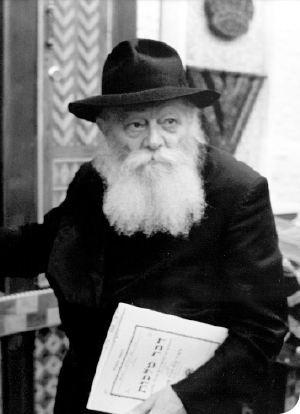Incredibly, when he returned from there, his father, the Rebbe nishmaso Eden, asked him whether the cell was spacious enough to contain three people. His query proves that their visit was in the form of physical bodies.
Translated and presented by Boruch Merkur
 After the daytime meal of Simchas Torah, the Rebbe concluded his sicha with the blessing: The main thing is that the Rebbe shlita should lead us to greet Moshiach Tzidkeinu, to Eretz Yisroel, to the true and complete Redemption.
After the daytime meal of Simchas Torah, the Rebbe concluded his sicha with the blessing: The main thing is that the Rebbe shlita should lead us to greet Moshiach Tzidkeinu, to Eretz Yisroel, to the true and complete Redemption.
(Toras Menachem 5711, pg. 52)
***
In the farbrengen of Yud-Tes Kislev 5711, the Rebbe MH”M refers to the story of the Alter Rebbe’s incarceration in the Petropavlovskaya fortress in Petersburg. There in prison, the Alter Rebbe was visited by his Rebbes – the Mezritcher Maggid and the Baal Shem Tov. These tzaddikim visited the Alter Rebbe posthumously, coming from the World of Truth. The Rebbe MH”M points out that it was not just their souls that appeared to the Alter Rebbe. Rather, “their visit was incarnate, in bodies”:
One time, my revered father-in-law, the Rebbe, visited this special place (see the sicha of 19 Kislev 5692, Likkutei Dibburim Vol. 4, pg. 750a, end). Incredibly, when he returned from there, his father, the Rebbe nishmaso Eden, asked him whether the cell was spacious enough to contain three people. His query proves that their visit was in the form of physical bodies. Indeed, it is known that the manifestation of the soul invested within a body is a higher revelation than that of the soul without the body (see, for example, Hemshech 5666, pg. 175).
(Ibid pg. 113)
***
On Shabbos Parshas VaYigash of that year, the Rebbe MH”M further develops the theme of the responsibility of the Chassid in utilizing the kochos the Rebbe gives him, elaborating on the verse, “And Yosef said… behold you have seed, so sow the soil” (VaYigash 47:23):
The words, “Behold you have seed,” signifies the influence received from Yosef HaTzaddik, especially following the histalkus [of the Rebbe Rayatz, whose first name is Yosef]. This concept is elucidated in Igeres HaKodesh, where it discusses the concept of גדולי גידולין מן אור זרוע לצדיק בשדה אשר ברכו ה.
“So sow the soil” – the activity of Yosef in providing “seed” does not suffice. Rather, every single person must take action on his own part, taking the seeds from Yosef and planting them in the earth. That is, to direct the energy received from Yosef towards the practical service of G-d, and to do this with bittul (the significance conveyed by “planting seeds”), and amidst goodwill and gladness (the concept of planting specifically in the “land,” being called “land – eretz” for it “wanted – ratzasa” to fulfill the will of its Master).
The result of this approach, as discussed in the beginning of the following parsha, is that “Yaakov lived in the land of Egypt seventeen years” – that “(he) lived” is achieved even (or precisely) in the land of Egypt. And not just “lived” (without any further description), but “lived…seventeen years,” the numerical equivalent of “tov – good.”
The main thing – as far we are concerned – is that the Rebbe shlita should take us out even from the land of Egypt, and lead us to our holy land, may it be rebuilt and reestablished, speedily in our days, amen.
(Ibid pg. 165)